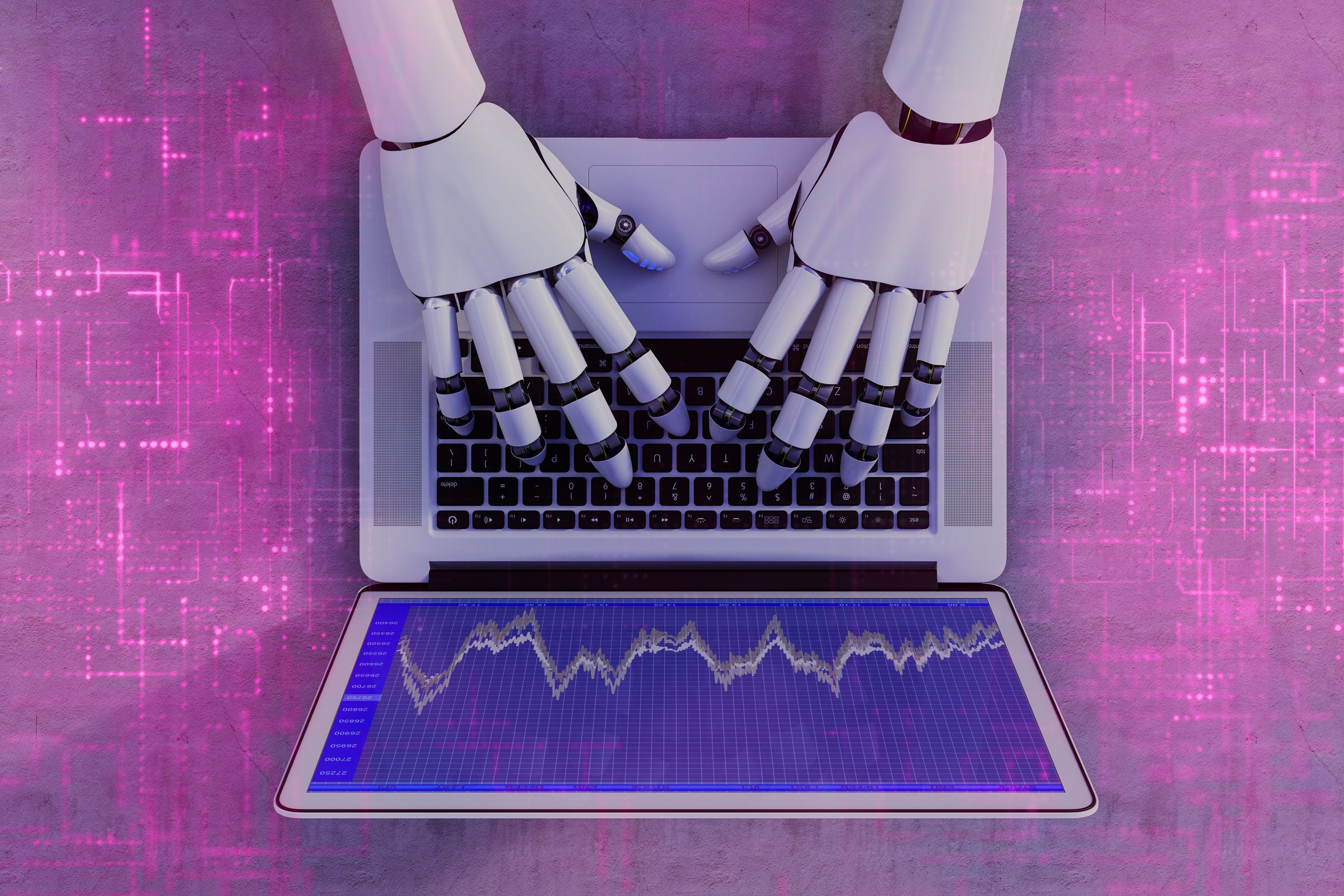Artificial Intelligence, or AI, has become a buzzword in recent years, capturing the imaginations of tech enthusiasts and captivating the minds of scientists and researchers. It seems like every day brings new breakthroughs and advancements in this rapidly evolving field. From self-driving cars to virtual assistants like Siri and Alexa, AI is permeating our everyday lives. But what does the future hold for this transformative technology? In this blog post, we will explore how AI is shaping our world and delve into its potential impact on various industries, job markets, and ethical considerations. So fasten your seatbelts as we embark on a journey into the exciting realm of artificial intelligence!
The Current State of AI Technology
The Current State of AI Technology
Artificial Intelligence (AI) has made significant advancements in recent years, revolutionizing various industries and transforming the way we live and work. Today, AI technology is more sophisticated than ever before, with capabilities that were once considered science fiction now becoming a reality.
One area where AI has made great strides is machine learning. Machine learning algorithms enable computers to learn from data and make predictions or decisions without being explicitly programmed. This has led to breakthroughs in areas such as image recognition, natural language processing, and autonomous vehicles.
Another exciting development in AI is deep learning. Deep learning models are inspired by the human brain’s neural networks and can analyze vast amounts of data to recognize patterns and solve complex problems. This technology has been instrumental in advancing fields like healthcare diagnostics, speech recognition, and financial forecasting.
AI applications have permeated various industries, from healthcare to finance to transportation. In healthcare, AI-powered systems can detect diseases earlier and with greater accuracy than human doctors alone. In finance, AI algorithms can predict market trends and optimize investment strategies. And in transportation, self-driving cars powered by AI have the potential to improve road safety while reducing congestion.
However impressive these advancements may be, ethical considerations surrounding AI loom large on the horizon. Issues such as bias in algorithmic decision-making pose challenges that must be addressed for us to fully embrace this technology’s potential benefits while minimizing its risks.
Furthermore, there are concerns about the impact of AI on the job market. While automation driven by AI technology may lead to certain jobs becoming obsolete or transformed significantly, it also creates new opportunities for workers who possess skills needed for managing or enhancing these intelligent systems.
Looking ahead into the future of AI technology holds immense possibilities yet untapped potential waiting for discovery! As researchers continue pushing boundaries through innovation within this field – who knows what lies ahead? The only certainty is that we’re living at an incredibly exciting time where artificial intelligence is shaping our world in ways previously unimaginable. So let’s embrace this
Advancements in AI: Machine Learning and Deep Learning
Advancements in AI: Machine Learning and Deep Learning
Machine learning and deep learning are two key advancements that have revolutionized the field of artificial intelligence. These technologies have enabled machines to learn from data, make predictions, and improve their performance over time.
Machine learning algorithms allow computers to analyze large amounts of data and identify patterns or trends within it. By using statistical techniques, these algorithms can make accurate predictions or decisions without being explicitly programmed for every possible scenario.
Deep learning takes machine learning a step further by incorporating neural networks inspired by the human brain. These complex networks consist of multiple layers of interconnected nodes that process information in a hierarchical manner. This allows deep learning models to extract higher-level features from raw data, enabling them to perform tasks such as image recognition or natural language processing with great accuracy.
The applications of machine learning and deep learning are vast across various industries. In healthcare, AI-powered systems can assist in diagnosing diseases based on medical images or analyzing patient data for personalized treatment plans. In finance, machine learning algorithms can detect fraudulent transactions or predict market trends for investment strategies.
However, there are ethical considerations that come with the use of AI technologies. Privacy concerns arise when personal data is used without consent or mishandled by AI systems. Bias can also be introduced if training datasets are not diverse enough, leading to discriminatory outcomes in decision-making processes.
Despite these challenges, the future looks promising for machine learning and deep learning technologies. As computing power continues to increase and more advanced algorithms are developed, we can expect even greater breakthroughs in areas such as autonomous vehicles, robotics, and natural language understanding.
In conclusion,
the advancements made in machine leaning and deep leaning have propelled artificial intelligence into new frontiers.
These technologies enable machines to learn from data,
make accurate predictions,
and perform complex tasks with remarkable precision.
From healthcare to finance,
AI has already made significant contributions across various industries.
However,
ethical considerations must be addressed to ensure the responsible and unbiased use of these technologies.
Looking ahead,
we can
Applications of AI in Various Industries
Artificial Intelligence (AI) has become an integral part of various industries, revolutionizing the way we work and live. From healthcare to finance, AI is being employed in a multitude of applications to enhance efficiency, accuracy, and decision-making processes.
In the healthcare industry, AI is significantly improving patient care and diagnosis. Machine learning algorithms can analyze medical data to identify patterns and predict diseases with high accuracy. This enables doctors to make informed decisions and provide personalized treatment plans for patients.
The financial sector has also embraced AI technology. Chatbots powered by natural language processing are being used by banks to interact with customers efficiently. Additionally, AI algorithms analyze vast amounts of financial data to identify trends, detect fraud, and make investment recommendations.
Transportation is another area where AI is making significant advancements. Self-driving cars are becoming a reality thanks to machine learning algorithms that enable vehicles to perceive their surroundings and make autonomous decisions on the road. This not only enhances safety but also improves traffic flow and reduces fuel consumption.
E-commerce platforms are utilizing AI-powered recommendation systems that analyze user behavior data to suggest products tailored specifically for each customer’s preferences. This personalization enhances the shopping experience while increasing sales for businesses.
The manufacturing industry benefits from AI through automation and predictive maintenance techniques. Robots equipped with computer vision capabilities can perform complex tasks in assembly lines more efficiently than human workers. Predictive maintenance models based on machine learning algorithms help companies reduce downtime by anticipating equipment failures before they occur.
These examples merely scratch the surface of how AI is transforming various industries today. As technology continues to advance at an unprecedented pace, we can expect even more innovative applications of AI in areas such as education, agriculture, energy management, and entertainment.
AI presents immense opportunities for growth across sectors; however it also raises ethical considerations related to privacy concerns,data security,and potential job displacement.
Integrating responsible governance frameworks will play a crucial role in ensuring that these technologies benefit society as a whole.
In the coming years, we can expect AI to become even more pervasive and integrated into
Ethical Considerations with AI
Ethical Considerations with AI
As the power and capabilities of artificial intelligence (AI) continue to advance, it is important to address the ethical considerations that arise from its use. One key concern is privacy. With AI’s ability to collect and analyze vast amounts of data, there is a need for strict regulations and safeguards to protect individuals’ personal information.
Another ethical consideration is bias in AI algorithms. Machine learning systems are trained on existing data, which can contain inherent biases. If these biases are not addressed, they can perpetuate discrimination or unfair treatment in areas such as hiring, lending, and criminal justice.
Transparency is also crucial when it comes to AI technology. Users should have a clear understanding of how decisions are made by AI systems and be able to access explanations for those decisions. This transparency helps build trust in AI technology and ensures accountability.
Furthermore, there are concerns about job displacement caused by automation. As more tasks become automated through AI technologies, certain jobs may become obsolete or require retraining for humans to adapt.
The development of autonomous weapons raises significant ethical questions about responsibility and accountability for their actions.
Addressing these ethical considerations requires collaboration between policymakers, technologists, ethicists, and society at large. It involves establishing guidelines that prioritize fairness, transparency,
and human well-being while harnessing the immense potential of AI advancements.
Impact of AI on the Job Market
Impact of AI on the Job Market
AI technology has made significant strides in recent years, revolutionizing various industries and transforming the way we work. As AI continues to advance, there is growing concern about its impact on the job market.
One area where AI is having a notable effect is automation. Tasks that were once performed by humans are now being automated through intelligent algorithms and robotic systems. This has led to fears that many jobs will become obsolete as machines take over.
However, while it’s true that certain roles may be replaced by AI, new opportunities are also emerging. The rise of AI has created a demand for professionals who can develop and manage these advanced technologies. Skilled workers who possess expertise in machine learning, data analysis, and programming will be highly sought after in the future job market.
Additionally, AI has the potential to augment human capabilities rather than replace them entirely. By automating repetitive tasks, employees can focus their efforts on more complex and creative aspects of their work. This shift may result in job redesign or retraining programs to ensure workers are equipped with the skills needed for this evolving landscape.
Furthermore, as businesses adopt AI solutions across different sectors such as healthcare, finance, and manufacturing; new career paths will emerge. Jobs related to managing and optimizing these technologies – like AI trainers or ethical engineers – will become increasingly important.
It’s essential for individuals to adapt their skill sets accordingly to stay relevant in this changing job market. Lifelong learning and upskilling efforts will play a crucial role in ensuring employability amidst automation advancements brought forth by artificial intelligence.
While some jobs may indeed be adversely affected by automation powered by AI technology; it’s important not to overlook the potential for innovation-driven employment growth as well.
Predictions for the Future of AI
Predictions for the Future of AI
The future of artificial intelligence (AI) holds immense potential and is expected to revolutionize various aspects of our lives. Here are some predictions for what lies ahead in the world of AI.
1. Enhanced Personalization: As AI technology continues to advance, it will become even better at understanding and predicting individual preferences. From personalized recommendations on streaming platforms to tailored shopping experiences, AI will bring unparalleled convenience and customization.
2. Autonomous Vehicles: Self-driving cars have already made significant progress, but the future promises even more advanced autonomous vehicles. With improved sensors, algorithms, and connectivity, we can expect safer roads and increased efficiency in transportation systems.
3. Healthcare Revolution: The healthcare industry stands to benefit greatly from advancements in AI. Intelligent machines can assist with diagnoses, drug discovery, and personalized treatment plans. This could lead to improved patient outcomes and reduced healthcare costs.
4. Smart Cities: As cities continue to grow and face challenges related to infrastructure management, AI-powered solutions will play a crucial role in creating smart cities that are sustainable, efficient, and responsive to citizens’ needs.
5. Collaborative Robots: The integration of robots into various industries will increase productivity and safety standards while working alongside humans rather than replacing them entirely. These collaborative robots or “cobots” have the potential to transform manufacturing processes by automating repetitive tasks while leaving complex decision-making tasks for human workers.
6 . Ethical Considerations : As AI becomes more prevalent in society , there is an increasing need for ethical frameworks around its use . Concerns such as privacy , bias , accountability , transparency ,and job displacement must be addressed proactively .
7 . New Job Opportunities : While some jobs may be replaced by automation , new roles centered around developing , maintaining , and managing AI technologies will emerge . A workforce equipped with skills like data analysis ,
machine learning,and programming languages will be highly sought after .
8 . Continued Research & Innovation : The field of AI is constantly evolving , and future breakthroughs are inevitable
Conclusion
Conclusion:
As we have explored the incredible advancements and applications of artificial intelligence, it is clear that AI is shaping our world in ways we could never have imagined. From revolutionizing industries such as healthcare and finance to transforming our daily lives with virtual assistants and smart devices, AI continues to push the boundaries of innovation.
However, as with any disruptive technology, there are ethical considerations that must be addressed. We must ensure that AI systems are developed responsibly and ethically, taking into account issues such as bias and privacy. It is crucial for policymakers, researchers, and developers to collaborate in establishing guidelines and regulations to govern the use of AI.
The impact of AI on the job market cannot be ignored either. While some jobs may become automated or augmented by AI technologies, new opportunities will also arise. To thrive in this evolving landscape, individuals should focus on acquiring skills that complement AI capabilities rather than competing against them.
Looking ahead, the future of AI holds immense potential. As technology continues to advance at an unprecedented pace, we can expect further breakthroughs in machine learning algorithms and deep learning techniques. This will enable even more sophisticated applications across various domains like autonomous vehicles, personalized medicine, climate change prediction, and much more.
In conclusion (not using “in conclusion”), artificial intelligence has already transformed numerous aspects of our lives today but its full impact is yet to be realized. With responsible development practices and ongoing research efforts dedicated to addressing ethical concerns while maximizing its benefits for society as a whole’, artificial intelligence has a promising future ahead – one where humans work hand-in-hand with machines to unlock endless possibilities.




